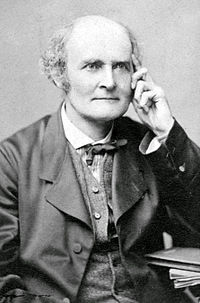Arthur Cayley
Scientist
Arthur Cayley F.R.S. (/ˈkeɪli/; 16 August 1821 – 26 January 1895) was a British mathematician. He helped found the modern British school of pure mathematics.As a child, Cayley enjoyed solving complex maths problems for amusement. He entered Trinity College, Cambridge, where he excelled in Greek, French, German, and Italian, as well as mathematics. He worked as a lawyer for 14 years.He postulated the Cayley–Hamilton theorem—that every square matrix is a root of its own characteristic polynomial, and verified it for matrices of order 2 and 3. He was the first to define the concept of a group in the modern way—as a set with a binary operation satisfying certain laws. Formerly, when mathematicians spoke of "groups", they had meant permutation groups. Cayley's theorem is named in honour of Cayley.
Personal facts
| Birth date | August 16, 1821 |
|---|
| Birth place | Surrey , United Kingdom , Richmond London |
|---|
| Nationality | |
|---|
| Date of death | January 26, 1895 |
|---|
| Place of death | England , Cambridge , United Kingdom |
|---|
| Residence | |
|---|
| Education | Trinity College Cambridge |
|---|
| Known for | Cayley–Dickson construction |
|---|
